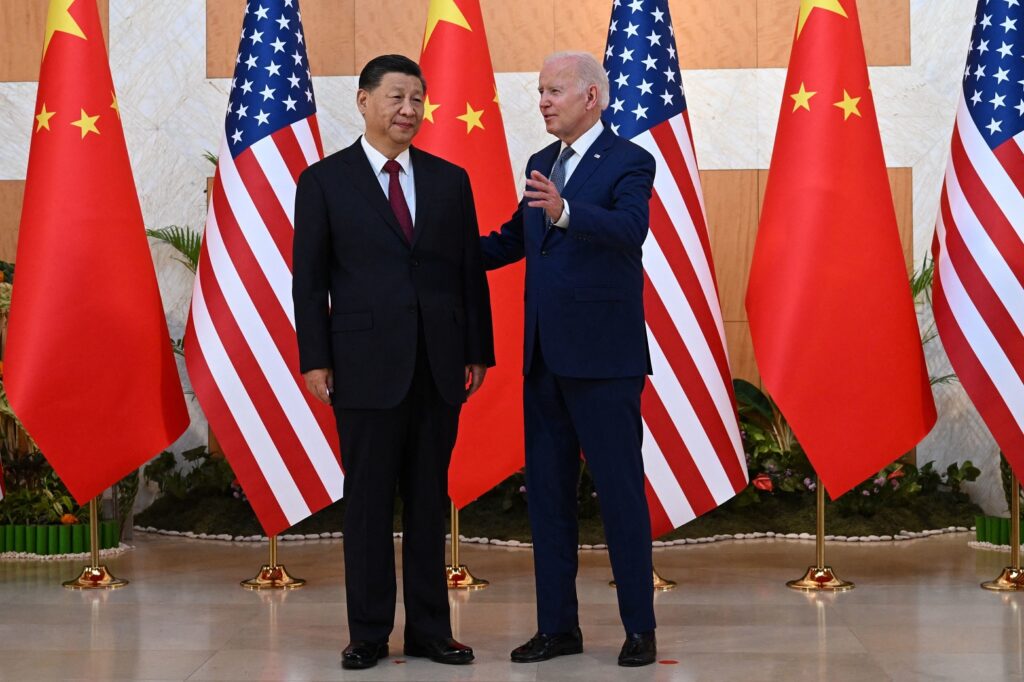
- Xi’s call for peaceful coexistence and being a “partner and friend” underscores China’s recognition of the need for normal relations with the U.S. and the West.
- Facing a slowing economy and its first quarterly deficit in foreign direct investment, China aims to attract foreign investors.
- Biden’s administration has agreed to resume military dialogues with China, a development welcomed for its potential to lower tensions.
- However, concerns persist about Chinese military behaviour, such as intercepts of U.S. ships and aircraft in international waters.
Chinese President Xi Jinping’s recent visit to the United States has garnered attention for several public relations successes. During a dinner in San Francisco, Xi received three standing ovations from the U.S. business community, indicating a positive reception. The visit, his first in six years, culminated in agreements with President Joe Biden on critical issues such as fentanyl, military communications, and artificial intelligence during the Asia-Pacific Economic Cooperation summit.
Remarkably, these outcomes favoured the United States, representing a shift from traditional negotiations where China might have sought concessions. According to insiders, the agreements addressed U.S. concerns, including the flow of fentanyl, and provided a platform for enhanced cooperation.
Xi, however, seemed to achieve his objectives as well. The trip offered an opportunity to secure U.S. policy concessions, easing bilateral tensions and refocusing on economic growth. Facing a slowing economy and its first quarterly deficit in foreign direct investment, China aims to attract foreign investors. Xi’s call for global businesses to deepen their footprint in China at the APEC CEO summit emphasized the commitment to address concerns like intellectual property theft and data security.
The geopolitical landscape, marked by political intrigues within the Communist Party and questions about Xi’s decision-making, adds urgency to the need for stable international relations. Analysts suggest that managing U.S.-China differences could allow Xi to redirect attention to pressing domestic matters.
One notable achievement was the promise of Chinese cooperation in curbing the flow of fentanyl to the U.S. In exchange, the U.S. government removed a Chinese forensic institute from a trade sanction list, signalling a diplomatic win for China. Critics argue that this move raises questions about the credibility of U.S. entity listings, particularly concerning alleged abuses against Uyghurs.
Biden’s administration also highlighted a successful agreement to resume military dialogues with China, a development welcomed for its potential to lower tensions. However, concerns persist about Chinese military behaviour, such as intercepts of U.S. ships and aircraft in international waters.
Xi’s public remarks emphasized China’s desire for peaceful coexistence with the U.S., positioning the country as a “partner and friend.” This messaging, along with a televised garden walk with Biden, aimed to reassure the business community concerned about China’s regulatory crackdowns.
Despite the positive optics, challenges remain. Sceptics argue that the U.S. missed an opportunity to leverage China’s economic challenges for more significant diplomatic gains. Questions about the Biden administration’s commitment to pressuring China on issues like Uyghur genocide linger.
Xi’s call for peaceful coexistence and being a “partner and friend” underscores China’s recognition of the need for normal relations with the U.S. and Western countries for continued economic progress. While ideological differences persist, pragmatism appears to have prevailed in the interest of mutual benefit.
As China navigates its complex relationship with the U.S., the outcomes of this visit are likely to have broader implications for global geopolitics and economic dynamics.
(The author is a postgraduate student in International Relations at Amity University, Raipur. He writes articles and research papers regularly on international affairs and geopolitics.)
